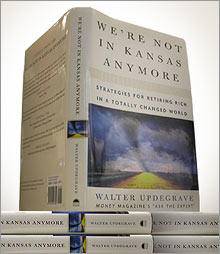|
|

|
|
More information on Updegrave's new book.
|
|
|
|
|
|
|
NEW YORK (CNN/Money) -
I'm 25 years old, have about $30,000 in my 401(k) and carry a $3,500 balance on my credit cards. I'm thinking about stopping my 401(k) contributions to pay off my credit-card debt. What do you think?
-- Chris, Stamford, Connecticut
I've got a better idea: How about you continue contributing to your 401(k) and at the same time make a concerted effort to get rid of that credit card balance as quickly as possible at the same time?
Clearly that means you'll have to shift some of your income from spending to debt repayment. With a $3,500 balance, your minimum payment is probably about $88 a month now. If you continue just paying the minimum (which will decline as your balance does), it could take you 23 years to erase your balance -- that's right, 23 years.
But if you pay $150 each and every month, you can get rid of that debt in just under two and a half years. Pay $250 a month and you'll eliminate the balance in less than a year and a half.
These figures assume your card charges 18 percent and that the minimum payment is the greater of $10 or 2.5 percent of your balance. By going to the credit card calculator at Bankrate.com and plugging in the information for your card, you can get figures that more accurately reflect your situation.
Pain is good, in this case
Yes, I know that making those extra payments may be painful. But in this case, pain is good. It will help you to remember how much more difficult it is to repay debt than it is to pile it on.
That's an important lesson to learn at any time. But if you can pick it up early in life, it's especially valuable since you'll be less likely to inflict damage to your finances later on through reckless borrowing.
Of course, you could take what the nuns at old St. Leo's grade school used to call the LLR, or "line of least resistance," which in this case would be halting your 401(k) contributions and using that money to repay your debt.
But, assuming you do that, what have you really accomplished? True, you've gotten rid of your debt. But you've also given short shrift to your retirement.
In effect, you've created a situation where the downside to racking up debt -- a smaller retirement nest egg -- is pushed off way into the future. Because the penalty is so remote and indirect, it's less likely to affect your future borrowing habits, which is to say, you might find yourself facing the same situation again.
Do what it takes to get the debt down
So my advice is that you continue making your 401(k) contributions and then do whatever you have to do to knock that credit-card balance down.
If that means eating out less often, or buying fewer neat electronic gadgets, or cutting back to basic cable, taking less lavish vacations or even skipping vacations altogether for a while, so be it.
In the end, I think this approach will be worthwhile because your retirement nest egg will continue to grow and you'll know from first-hand experience just how difficult it is to get out of debt once you've sunk into it.
And unless you're some sort of glutton for deprivation, once you've learned that lesson you should be less likely to let your credit-card balance get out of control again.
Walter Updegrave is a senior editor at MONEY Magazine and is the author of "We're Not in Kansas Anymore: Strategies for Retiring Rich in a Totally Changed World."

|